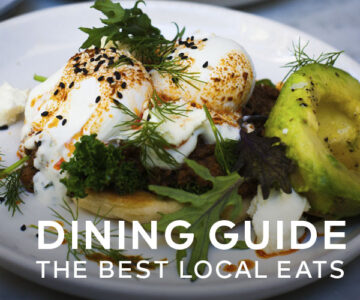Feeding the Soul
Communal gardening helps newcomers nourish the sense of community lost when they were forced to flee their homeland.
7:45 on a cool, clear Tuesday evening in early July: Mohammed Sulyman squats beside a garden plot in the middle of a field in Mono. He feels around a dense cluster of leaves and stalks. Then, finding purchase in the dark soil, he tugs sharply upward, spraying his Detroit Red Wings hoodie with flecks of brown as he unearths a small, alabaster-coloured bulb.
Mohammed examines the vegetable’s fleshy underbelly and twining roots before turning to Ruwaida Al Shakush, who kneels atop the fraying landscape fabric stretched on the ground next to him.
“How do you say?” he asks, holding up the bulb. “Radish?”
Ruwaida looks up from beneath her white-and-periwinkle floral headscarf. “Turnip,” she declares.
Mohammed frowns. “Not the same as ‘radish’?”
Ruwaida shakes her head.
“Oh my gosh,” he sighs, throwing up his hands in mock despair.
He winks at Fatina, Ruwaida’s 13-year-old daughter, who giggles from the next plot over.
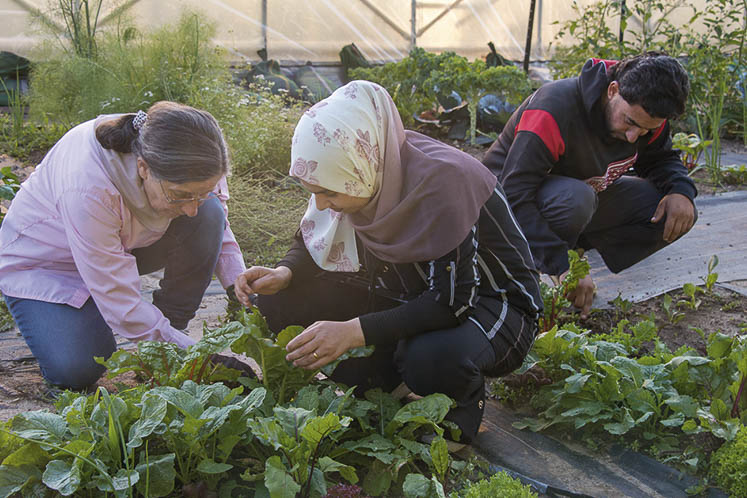
Audi Geadah Ogley, Ruwaida and Mohammed harvest a crop of greens in July. Photo by Pete Paterson.
Though they had not met before this year, both Mohammed and Ruwaida are from Syria. Both also spent nearly a decade in refugee camps in Jordan before sponsorship groups in Headwaters helped them and their respective families settle in the Dufferin area.
On that July evening, Mohammed and Ruwaida were among those who gathered to grow food together at Am Braigh Farm in Mono.
“We’re calling the program ‘Trust Yourself to Garden’,” said farmer and retired Orangeville District Secondary School teacher Jamie Richards when we spoke over the phone a week earlier. Jamie owns Am Braigh farm, a three-acre property where he operates a market garden dedicated to regenerative agricultural practices. Jamie was also the force behind the gardening group that brought Mohammed, Ruwaida, and others to Am Braigh several times this past spring and summer. The group was created for individuals and families who had recently resettled in Canada.
From the start, Trust Yourself was premised on the understanding that shaping a new life – carving out a secure, sustainable home somewhere, anywhere – is a long-term project. During lockdowns this past winter, Jamie sought ways to help Headwaters residents in precarious situations, particularly the Syrian and Eritrean newcomers sponsored by various local groups. Increasingly frustrated by the short-term relief offered by donations and food banks, Jamie hoped to provide more lasting support.
In February, Jamie told the congregation of his Orangeville church, St. John’s Anglican, about his plan to put together a food security teaching group for newcomers. Soon afterward, he was approached by fellow church members Chris Cox and Audi Geadah Ogley. Chris, a retired Headwaters nurse who came up with the program’s name, remembers starting her first garden after moving to Canada from England in the 1970s. Audi is an Arabic speaker who fled Lebanon’s war zone for Canada 38 years ago. As the program at Am Braigh got underway, Audi’s interpreting abilities proved indispensable.
Next to come on board was Marci Lipman, champion of local agricultural initiatives including the Headwaters Food and Farming Alliance, the Dufferin County Farm Tour and the Headwaters Farm Fresh guide. Together, Jamie, Chris and Marci reached out to members of the Headwaters community involved in refugee sponsorship and resettlement. Beginning in late May, the gardening took place at Am Braigh every other Tuesday. It wrapped up with discussions of food preservation and a harvest-inspired communal dinner in late August.
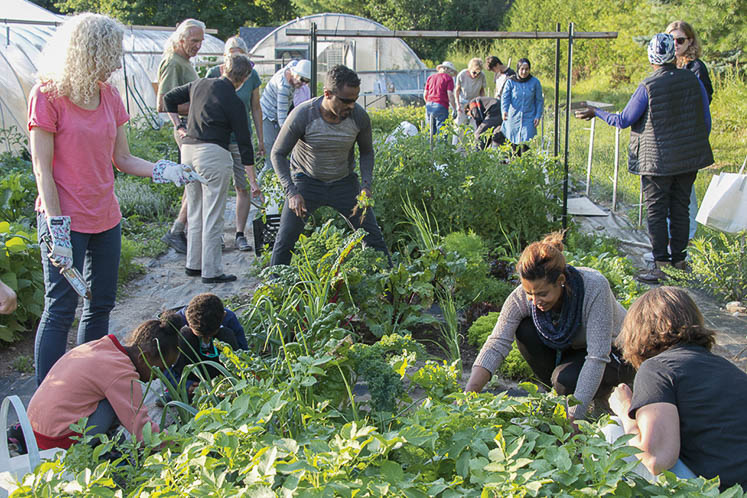
The lush garden plots were abuzz with activity in July. At summer’s end, the gardeners cooked an international feast. Photo by Pete Paterson.
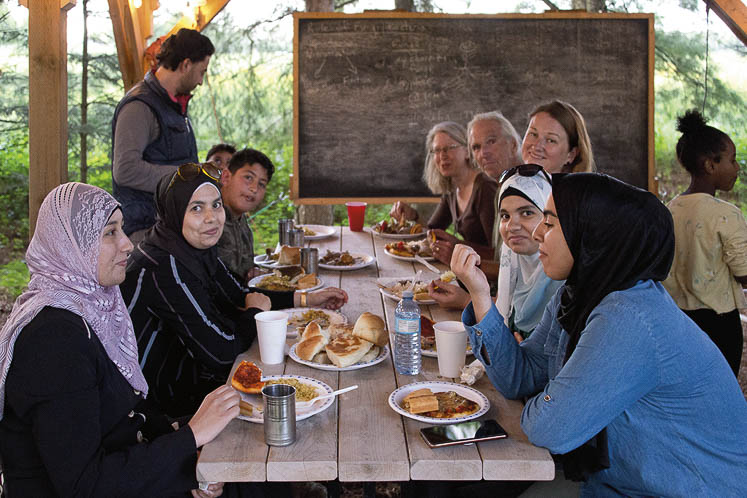
After a summer of growing, the Am Braigh gardeners celebrated with a communal dinner. Photo by Pete Paterson.
I visited the group’s fourth session in July. Along with Jamie, the gathering included Mohammed, Ruwaida and six other newcomers, as well as Chris, Marci, Audi and five other enthusiastic volunteers. Before heading out to the garden, the group convened around picnic tables under a tall, wooden gazebo on Am Braigh’s front lawn. They listened as Jamie read the evening’s agenda (weeding, harvesting, replanting, watering) from a large mobile chalkboard. There was a pause when he finished, and Jamie realized he had said a lot at once. Sheepishly, he turned to the compact, animated woman seated next to me, whose silvering ponytail matched the checkmark on her high-top Nikes.
“Can you make that into something, Audi?” he asked.
Audi could. And she continued to interpret as the group wandered over to the garden, a field of eight- by three-foot plots over which the setting sun, partially obscured by the maples bordering Mono’s Fifth Line, laid down long, honey-coloured panes of evening light. She offered Arabic equivalents for Jamie’s various suggestions and seed propositions: “Anybody need cilantro? We’ve got lots of dill …”
The volunteers moved plot to plot, offering a smile or soil-streaked hand where needed. Many of the newcomers were familiar with the techniques and plant varieties at hand. Several had gardened in their home countries. Tesfahiwet (who requested his last name not be used) grew up in a rural Eritrean village and worked on a farm during his four-year displacement in Israel. This was probably why Jamie blushed when, 15 minutes into the session, he called out “Teacher announcement!” With cheerful self-deprecation, he asked everyone to pause for a moment as he demonstrated how to cut romaine without ripping up the roots.
When I asked whether Marci had taught before, the tanned, wiry agricultural enthusiast snorted. “Teaching?” she asked incredulously. “I’m learning! We’re all learning. We’re learning about these other amazing people who live right here.”
A hub of sponsorship
Sponsorship of Syrian refugees in Headwaters began around 2015, when the world was shocked by images of a drowned two-year-old Syrian boy, Alan Kurdi. The toddler’s body washed up on a Turkish beach after the crowded dinghy carrying him, his family and other Syrian migrants capsized during their attempted flight across the Mediterranean Sea. At the time, the Canadian government pledged to resettle tens of thousands of Syrians trying to escape the country’s violent civil war.
Among the first Syrian newcomers to reach Orangeville were Emad and Razan Al Haj Ali and their children Fatema and Mohammed. The family was supported by the Headwaters Refugee Sponsorship Group organized by Westminster United Church and spearheaded by Brian and Philomena Logel. They landed at Toronto’s Pearson Airport in December 2015. Razan gave birth to the family’s youngest daughter, Sara, later that winter.
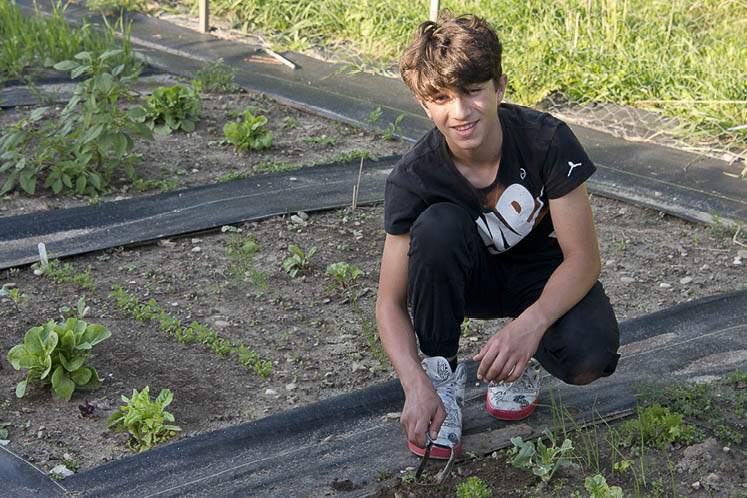
Mohammed Al Haj Ali weeding his plot. Photo by Pete Paterson.
The family’s oldest son, Mohammed Al Haj Ali, was an eager participant in the gardening group this past summer. When Mohammed arrived in Canada, he did not know how to say “hello” in English. But, sprinkling beet seeds into shallow, palm-sized depressions in the soil at Am Braigh this July, the middle-schooler spoke the language confidently as he remembered catching a last, car-window glimpse of home through smoky explosions.
Mohammed went on to describe the subsequent three months he spent with his family in the Syrian Desert, unsure whether his cousins or friends had survived the bombardment. He also recalled the cramped exhaustion of sleeping on the floor for three years in a Jordanian refugee camp, as well as the sheer strangeness of his first night at the Logels’ house in Orangeville. He has grown to love the area and its spacious countryside over the past six years, and began planting his own radishes and green onions in his backyard in the summer of 2021.
“Don’t you think it’s great Canada has so much farmable land?” he burst out during a pause in our conversation.
The crisis in Syria appeared to fade from many Canadians’ consciousness following the first flurry of refugee sponsorships. Yet newcomer resettle-ment and support efforts in Headwaters have quietly, passionately continued. Since the arrival of the Al Haj Ali family, the Headwaters Refugee Sponsorship Group has helped three other families, including young Mohammed’s uncle and aunt, Mohammed and Angham Sulyman, and their children, Saddam and Abdulaziz, who arrived in December 2021.
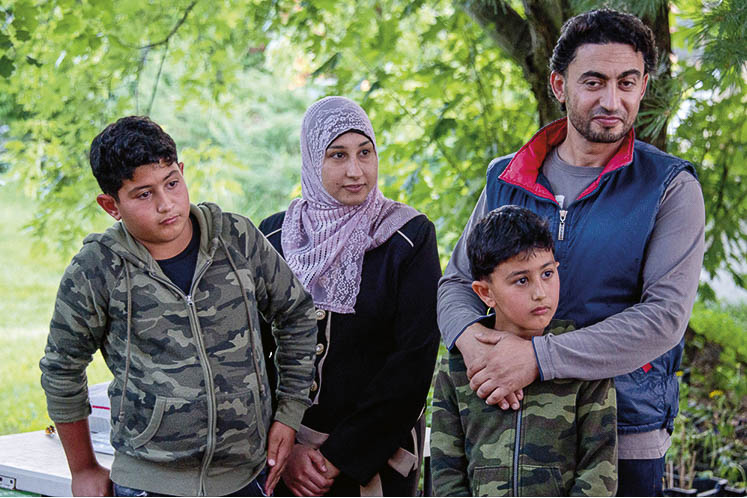
The Sulyman family. Photo by Pete Paterson.
Similarly, there is a general lack of awareness about the dire conflict and human rights abuses which have brought approximately 26,000 Eritrean newcomers to Canada over the past seven years. Still, a volunteer group formed at Orangeville’s Compass Community Church in 2015 has focused their sponsorship efforts on individuals and families escaping the East African country’s authoritarian state. As of this past summer, the church’s Newcomers Settlement Team had raised funds and welcomed 21 Eritreans to the area. That number includes Trust Yourself gardener Kudusan Engida and her son, Amanuel Tedla. The two fled Eritrea’s capital city, Asmara, in 2009, after Kudusan’s husband, from neighbouring Ethiopia, was accused of spying on behalf of his birth country.
I was invited to visit Kudusan’s cozy, meticulously kept apartment during a heat wave in July. As we nursed ice-cold bottles of water at her kitchen table, Kudusan described how, before reaching Orangeville in December 2018, she and Amanuel spent nine years in Nairobi, Kenya – an unfathomably challenging period during which Kudusan experienced partial facial paralysis and acute memory loss. Driving a pen into the ringed spine of her ESL textbook, Kudusan explains that she was unable to afford proper medical treatment at the time.
Kudusan also told me that she has not heard from her husband since he was detained more than a decade ago. She showed me phone pictures of her nephews, who have fled to Ethiopia to avoid being conscripted by the Eritrean government. At Am Braigh on the following Tuesday, Kudusan sent me home with two bags full of green and red head lettuce from her plot.
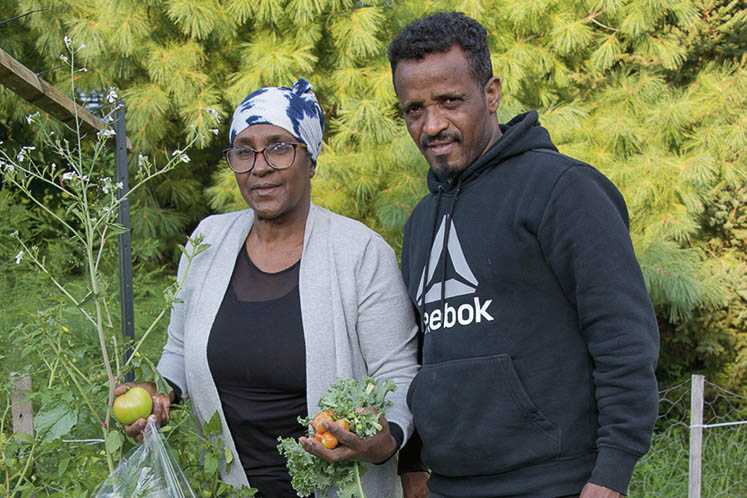
Kudusan Engida and Tesfahiwet reaped an ample harvest. Photo by Pete Paterson.
Welcoming newcomers to Orangeville is no simple task. In an interview, Ami Alexander, a volunteer at the core of Compass Church’s efforts, recited a long list of sponsorship responsibilities: fundraising, completing paperwork, securing housing in an accessible location, arranging ESL classes, enrolling kids in school, setting up banking and access to medical care, helping to find jobs, and so on.
In rural areas like Headwaters, these responsibilities take on additional dimensions. Jenny Miedema, a regular Am Braigh volunteer who has led resettlement efforts at Compass Church, Centre Fellowship Church and Remember Ministries, the non-denominational charity she founded in 2020, has been involved in sponsoring more than 75 newcomers. When we met over Zoom, she explained how ESL resources, affordable housing and readily accessible public transit can be hard to come by outside of urban centres like Toronto.
For Jenny, though, the sheer friendliness of a town like Orangeville offsets any inconveniences. While some newcomers eventually move elsewhere as opportunities present themselves, Jenny stressed what a privilege it has been to show recently arrived families around her hometown for even a brief time. “I’ve been here my whole life,” she said. “It’s like an extended family. And I love that that family is changing. We’re growing bigger, richer.”
Sowing community
Over the past couple of pandemic years, opportunities to forge friendships have proven rare. This is, in part, why sponsors enthusiastically encouraged newcomers to participate in the Trust Yourself program.
Of course, there is immense value in reaping armfuls of fresh herbs and vitamin-rich root vegetables. Envisioning future iterations of the program, Jamie plans to keep the focus on sustainable food skills. Even so, he echoes other volunteers in emphasizing how the value of the gardening group has been as much about finding community in an especially solitary set of circumstances as it has about learning to grow food. After all, the pandemic substantially deepened the day-to-day sense of isolation that inevitably attends arriving in a foreign, faraway country.
Referring to the Sulyman family’s first year in the Orangeville area, sponsor Brian Logel said, “Normally, we’d have newcomers over to our house all the time, and we’d go over to theirs. The whole thing would be very hands-on. But these days are tough. We have to be masked, cautious.”
Adelle Barr-Klouman, who volunteers with First Line for Syria, a Mono sponsorship group partnered with the United Church’s Shelburne Primrose Pastoral Charge, described a socially distanced welcome for Ruwaida, her husband, Ahmad Al Diri, and their six children last October. After eight years in Azraq refugee camp in Jordan – where Ruwaida’s youngest daughter was born – the family arrived in Canada to partial restrictions, including the need to quarantine for two weeks.
First Line managed to secure housing early enough that Ruwaida and her family could isolate in their new, fully furnished Alliston home, with a stocked fridge and extra clothes in the closets. Still, arriving amid Covid-19 and just before lockdowns over the winter holiday can only have intensified an already world-rending shift. Both Ruwaida and Ahmad left behind close family at the camp. A pandemic-induced lack of ESL programing has meant the couple is learning to speak English in relative solitude, with tutors who visit their home, rather than as part of a group.
During the fifth gardening session in late July, I asked their daughter, Fatina, what it was like to attend classes remotely so soon after she had started at her new school. She shook her head. “Not good.” She paused as she searched for the word she wanted: “Lonely.”
Other newcomers described similarly solitary situations, as ESL classes, kids’ schools, and church services moved online. As a result, there have been fewer chances to get out into the area and surround themselves with the kinds of people who, over time, could make a place feel like home.
It was the desire to provide one such chance that moved volunteers to pick up newcomers every other Tuesday this past summer and drive out to Am Braigh. What started as a food security teaching group grew into a lively, inclusive community gathering, whose participants all shared an understanding that the vegetables gleaned from our gardens are not the only things that feed us. Our bodies need other things to be nourished and grow: human company, human kindness.
Fortunately, opportunities for social interaction at Am Braigh proved abundant. On the night of the fifth session, Mohammed and Ruwaida conversed in Arabic while cutting Swiss chard from neighbouring plots. Jamie and Audi showed Fatina how to identify thyme by its thin, woody stems and fragrant leaves, while Marci and young Mohammed weeded out pockets of invasive purslane. And, gathered in the gazebo, Kudusan, Tesfahiwet and Helen Gebremariam, a more recent newcomer from Eritrea sponsored by Compass Community Church, discussed plans to prepare two traditional Eritrean dishes together for the upcoming group dinner.
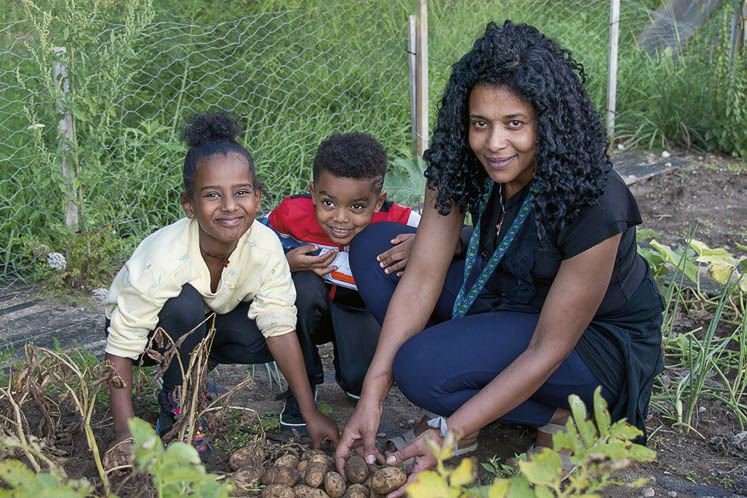
August brought a good potato crop for Helen Gebremariam and her childen Elanta and Nathan. Photo by Pete Paterson.
The gardening sessions also offered newcomers a chance to connect with the area’s distinct and beautiful countryside. A feeling of rootedness comes from sticking your hands in Mono’s glacier-deposited, loamy soils – from getting to know the particular hardy plants and persistent insects that populate Headwaters.
It is this sense of connection to the land that so many of the Am Braigh gardeners lost when they were cleaved from their home countries. Some never wholly felt as though they had it. Helen, who previously lived and worked as a photo and video editor in Asmara, had not gardened before coming to Canada in November 2021. For four years in a refugee camp in Ethiopia, the omnipresent threat of kidnapping prevented her children, Elnata and Nathan, from playing outside. Said Helen, “Even I was afraid to go out.”
On the night I met Helen, eight-year-old Elnata and Nathan, who was five at the time, were with her, and we watched as the kids raced around the field in a many-limbed stream of ticklish evening energy. It was hard to picture the two anywhere else, much less trapped indoors in an Ethiopian refugee camp. Elnata and Nathan seemed made to tackle each other into tomato vines, to crab walk across Jamie’s front lawn and topple over, laughing, in the lush midsummer grass.
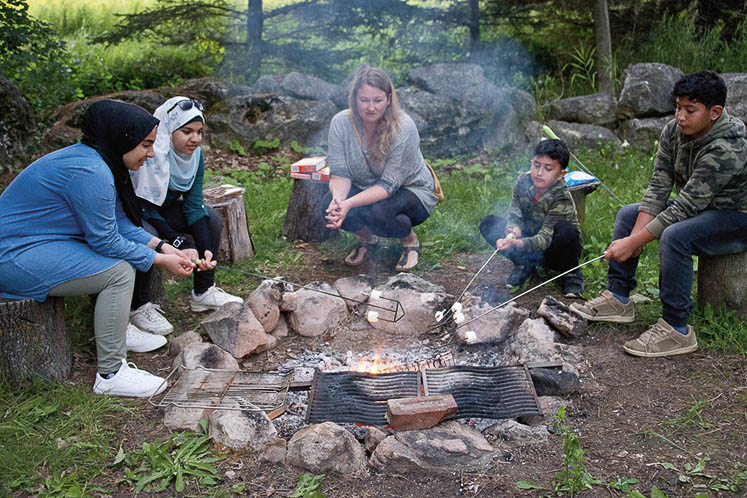
Dinner ends with a feast of halal s’mores around the Am Braigh campfire. Photo by Pete Paterson.
Indeed, if the younger participants in the program were any indication, the human and land connections created on Tuesday nights at Am Braigh will endure. The first evening I visited, young Mohammed and Fatina were the last to leave the garden, dousing their covered seeds in water from green plastic cans after everyone else had retreated to the gazebo for snacks. So focused were they on their tasks that I knew I should leave them be, tending carefully to their plots in the gentle pre-dusk. But I could not help asking: “Will you keep gardens of your own when you grow up?”
Both nodded.
I pressed. “What will you plant?”
Mohammed, intent on watering each head of lettuce, each newly covered seed, did not reply. But Fatina, finished now, looked up and cocked her head.
“Green onion,” she said, after a moment. “And lettuce.”
“No turnips?” I asked.
“No turnips,” she said decisively. Giggling, she ran off to join the others for cookies, lemonade and conversation.
Related Stories
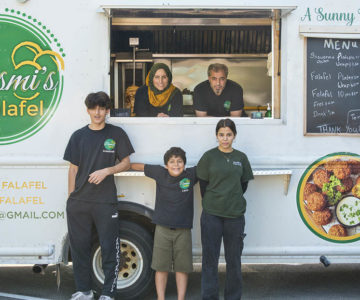
How Food Found the Path to a Community’s Heart
Sep 20, 2022 | | CommunityFrom the farmers’ market to the food truck, Rasmi’s Falafel has become a familiar name in Orangeville, sharing a ‘sunny taste of Syria’ since 2016
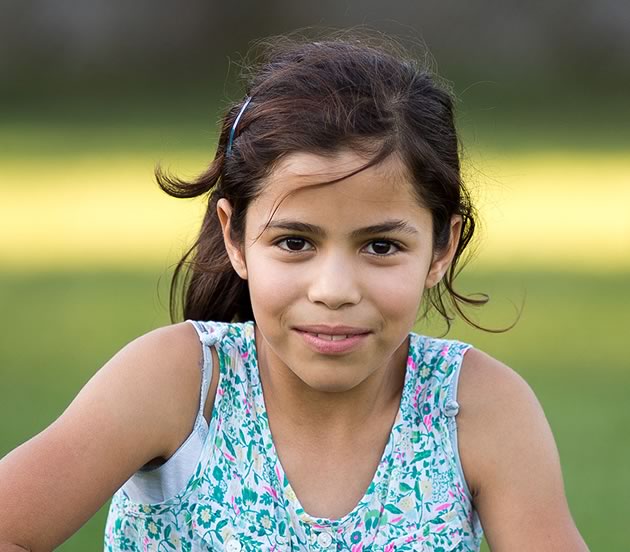
Syrian Refugees in Headwaters
Nov 22, 2016 | | Back IssuesEach Syrian refugee settling in the hills arrives with hope for a safer life. Here we meet some of them, along with the locals who are lending hands – and hearts.
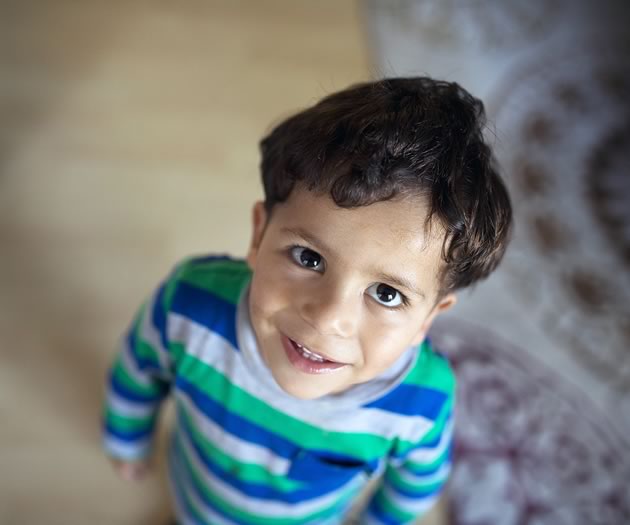
Season of Hope
Nov 22, 2016 | | DepartmentsThe Syrian refugee children who have settled in Headwaters give us reason to be optimistic for 2017 and beyond.
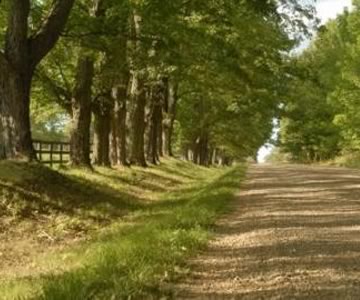
Am Braigh
Apr 24, 2018 | | On-farm storeYear-round vegetables, eggs, sourdough bread, soups and entrées by local chefs using Am Braigh produce

